UPDATE: Join me for a reception and screening of Daughter of Shanghai at the Metrograph in NYC on March 14, 2024, where I’ll be in conversation with New Yorker writer Mayukh Sen. Sponsored in part by Asian CineVision and Yao King. Tickets available here (use code AMW40 at checkout for 40% off the annual membership).
I pushed play on the first episode of Beef, the Netflix series starring Steven Yeun and Ali Wong, with not a little curiosity. What would the latest addition to the Asian American canon bring to the table?
Beef begins with Danny Cho, played by Steven Yeun, waiting in line at a hardware store to return four hibachi grills and a carbon monoxide detector. We haven’t quite done the calculus on these odd purchases before the camera moves on, but we begin to understand Danny’s outlook as he endures the small indignities of ordinary life: the customer ahead of him chatting up the cashier as the line gets longer, searching in his wallet for the receipt he knows he has but can’t find, being called out by the cashier over the loudspeaker, trying to put on his seat belt only to have it stick several times. When you’re barely holding it together like Danny is, these are the kinds of minor setbacks that pile up on a bad day and can send the whole thing tumbling.
And that’s exactly what happens when Danny tries to back his red pickup truck out of the parking lot, only to have someone in a white SUV honk and flip him off. The faceless driver speeds away, Danny follows hot on their trail, and an epic road rage chase ensues. As someone who has spent many hours navigating the streets of greater Los Angeles, this scenario was instantly familiar. I held my breath as I watched the two cars careening through traffic, oblivious to the stunned pedestrians and flummoxed drivers in their paths, wrecking diligently landscaped yards on quiet suburban streets as they pursued some reckless vendetta. I was hooked.
The next swerve in the story comes when we discover that the driver in the white SUV is Amy Lau, played by none other than Ali Wong. Although Beef is not the only film or TV series to exploit the cinematic possibilities of a road rage narrative (see Steven Spielberg’s classic 1971 film Duel), there’s something surprising about seeing two main characters, both rage-filled Asian Americans, antagonizing each other. Then there’s the subtext around the racist refrain that all Asians are bad drivers. I’m sure I’m not the only one who was waiting for a white lady to poke her head out of the SUV and yell some expletive at Danny for driving while Asian.
Before I go any further, I need to mention the elephant in the room. Despite the fervid response from viewers and critics (Beef has an average tomatometer score of 98% on Rotten Tomatoes and became the second-most-watched show on Netflix), the series has one major black mark against it: employing and defending castmember Dave Choe around claims he made on a 2014 podcast that he raped a Black masseuse. I won’t rehash all the details here since there are plenty of articles, like this one and others, that explain the intricacies of this controversy. Whether or not Choe’s original statements are true, the half-hearted response from Netflix and Beef stars Steven Yeun and Ali Wong disappointed many in the community.
Controversies aside, Beef is noteworthy for scripting its story around two ostensibly ordinary people who happen to be Asian American—the driver next door—without turning the narrative into the typical stirring quest for identity and belonging that we’ve become familiar with in films like Crazy Rich Asians, The Farewell, and Everything Everywhere All at Once. Instead, the series makes a revolutionary assertion: Asian American characters no longer have to represent a monolithic version of Asian America (which frankly does not exist). This realization is strangely liberating. Finally, we can embrace the Asian American dirtbags, slackers, and scammers we’ve been waiting for!
And yet, as quietly revolutionary as Beef is, it’s not the first time we’ve seen two Asian American actors play “regular” Asian American characters on screen. That distinction, of course, belongs to Anna May Wong and Philip Ahn. They were just two Asian American kids who grew up together on North Figueroa Street in downtown L.A. and happened to make it into the movies. Anna May’s father owned the Chinese laundry on the block, while Philip came from a Korean American household.
In fact, the Ahns weren’t any Korean family. Philip’s father, Ahn Chang Ho, more commonly known as Dosan, was one of Korea’s foremost leaders in the early twentieth century. As a statesman and anticolonial revolutionary, he organized Koreans on both sides of the Pacific. When he and his wife Yi Hye-ryeon (also known as Helen Lee) immigrated to the U.S. in 1902, they were the first married couple from Korea to enter the country. Three years later, Helen gave birth to their first child, Philip, who, according to some accounts, was the first Korean American born in Los Angeles.
Dosan continued his political work as his family grew, and he returned to Korea in 1907. When Japan annexed Korea several years later, he was exiled from his homeland. In the mid-1920s, he went to Shanghai to serve as the exiled Korean Provisional Government’s prime minister. It was there that he was captured by Japanese forces, brought back to Korea, and imprisoned under house arrest. Long separated from his family, Dosan died in 1938 after suffering through many years of incarceration and torture. He is remembered today as a hero of the Korean independence movement.

So how did the son of an illustrious Korean leader get mixed up in the phony, fatuous world of Hollywood? Well, AMW may have had a thing or two to do with that. In 1923, when she was busy trying to make a name for herself in Douglas Fairbanks’s The Thief of Bagdad, Philip was the one who drove her back and forth from the Pickford-Fairbanks Studio on Santa Monica Blvd. AMW had bought herself a slick new Studebaker Oldster with some of her movie earnings. There was only one problem—she didn’t know how to drive it. (Future clashes with the traffic police would be a recurring theme whenever the young AMW got behind the wheel.) So Philip gamely filled in as chauffeur. He also likely enjoyed the notoriety of showing up to school in a convertible Oldster.
One day while Philip was waiting curbside at the studio to pick AMW up, he caught the eye of Douglas Fairbanks. Of course, Doug was on the lookout for “exotic” types for his Arabian Nights fantasy and immediately tried to corral Philip into the production. Excited at the thought of making his own foray into moving pictures, Philip agreed to make a screen test.
“I’ll never forget that day,” he later told a reporter. “Still wearing my make-up, I proudly came home to tell mother the great news. ‘No son of mine is going to get mixed up with those awful people,’ she shouted. I wasn’t allowed out of the house for the next three days.”
Despite his mother’s disapproval, Philip didn’t give up completely on his dream of one day joining the ranks of actors like his friend Anna May. In the meantime, he focused on his responsibilities as the eldest son and helped support his mother, who was often left alone to raise the family’s five children. As early as nine years old, Philip took on jobs selling newspapers, washing dishes, operating elevators, and delivering produce. After graduating from high school, he went into business running a fruit stand at a Tower Grocery Market. He also continued to take an active role in the Korean American community and used his status as an American citizen to lease land for Korean immigrant farmers.

All the while, Philip continued to nurture his love of theater, acting in school and church plays. On his father’s last visit home to Los Angeles, Dosan gave Philip his blessing to follow his calling: “Film is also an art; all I ask is that if you want to become an actor, be the best that you possibly can.”
Philip’s lucky break came in 1935 while he was enrolled as a student at USC. He’d applied for a part-time business position at Paramount Studios but instead was asked to audition for director Lewis Milestone because he needed someone to play a Chinese comedian in the Bing Crosby musical Anything Goes. Philip’s perfect English almost lost him the part; Milestone wanted the character to speak pidgin. Thinking fast, Philip pulled out his best “Oh, so sollie, honorable sir” impression to clinch the role and secure his future as an actor. The things Asian Americans had to do to get hired! Within a few years, friends Philip and Anna May were reunited, but this time on the silver screen.
In 1937, after returning from her one-year sojourn in China, AMW signed a new contract with Paramount. Her travels had irrevocably changed her outlook on the kinds of roles she played, and as a result, she was determined to take on parts that showed the Chinese in a positive light. To this end, she persuaded Paramount to make several crime thrillers in the vein of the successful Charlie Chan series, in which she would play the crime-busting heroine. The first of these vehicles was a film titled Daughter of Shanghai.
**SPOILERS UP AHEAD**
The story follows a young Chinese American woman named Lan Ying Lin and her father Quan Lin (played by Chingwah Lee) who owns a Chinese art and antiques business. At the same time, an international trafficking ring has been smuggling immigrants into the country illegally and selling them into exploitative work contracts. These same smugglers pressure Quan to hire some of their workers. He refuses, ignoring their threats of violence, and later tells his daughter that he plans to report them to the authorities.
Strangely enough, an incident involving a car also sets off the chain of events in Daughter of Shanghai. That same evening, Lan Ying and her father head to a client’s home where they intend to hand over evidence to government officials. Unbeknownst to them, their usual chauffeur has been replaced by one of the smuggling ring’s operatives. Instead of driving them to their destination, he heads toward the wharf and drives the car into an empty trailer truck. The driver flees and swings the truck door shut, trapping them inside, while another associate shoots at the two helpless victims in the dark interior from the truck cab, killing Quan Lin. As the henchmen prepare to dump the evidence of their dirty deeds, Lan Ying slips out in time to watch the car with her father’s dead body inside roll out of the truck and off the edge of the pier into the harbor.
Enter Kim Lee, the dashing federal agent who takes on the case and assures Lan Ying that he will bring her father’s murderers to justice. Although an early version of the screenplay suggested Keye Luke for the role, the actor best known for his recurring bit as Charlie Chan’s number one son, Philip Ahn ultimately got the part. It’s likely AMW held some sway over casting, but her childhood friend played the role with aplomb, looking quite smart in a double-breasted suit and tie.
Government man or not, Lan Ying is not one to sit back and watch others handle things. She’s the heroine of this story, after all. Thus, Kim and Lan Ying embark on separate quests to uncover the boss behind the human trafficking scheme. Each traces the group’s dealings to a rough and tumble town in Port O’ Juan, where the two sleuths bump into each other again. By this time, Lan Ying has reinvented herself as a dancer at a local saloon so that she can infiltrate the club’s backroom, while Kim, disguised as a sailor, pretends to be an interpreter in order to aid the smugglers with their foreign “cargo.” Now working together, our two gumshoes ultimately crack the case and outwit the bad guys in a thrilling, sometimes humorous, final action sequence that goes above and beyond typical B-movie fare.
What’s more, Daughter of Shanghai concludes with the happy ending that eluded Anna May for nearly two decades. Sitting in the backseat of an automobile, that classic setting of so many movie romances, Kim Lee and Lan Ying turn to each other with misty eyes:
Kim: How would you like to live in Washington?
Lan Ying: Perhaps a change of climate is just what I need.
Kim: Then it’s settled.
Lan Ying: Does that mean you’re asking me to marry you?
Kim: [in Cantonese] Do you want to marry me?
Lan Ying: [in Cantonese] I’m happy that you love me.
Did moviegoers who watched Daughter of Shanghai at their local theater in 1937 register the significance of this scene? It was the first time two Asian American actors occupied leading roles in a Hollywood film. And not only that, but they were cast as the heroes of the story and romantic partners who get to enjoy their happily ever after (unlike AMW and Sessue Hayakawa in Daughter of the Dragon). For all the talk of the treacherous dragon lady types AMW was made to play and the ghastly ends her characters met over and over, few stop to remark on her monumental achievement in Daughter of Shanghai.
Before I had ever watched the film, I remember being somewhat awestruck as I flipped through the Daughter of Shanghai publicity stills archived in Philip Ahn’s personal papers at USC. He and Anna May both looked so badass, sneaking around the villain’s lair decorated with outlandish artifacts from the Orient (reminiscent of billionaire Jordan Forster’s headdress collection in Beef). For once, they could dispense with Hollywood’s stereotypical exotica and assume roles that, despite their extraordinary circumstances in the film, were closer in spirit to who Philip and Anna May were in real life—the kids next door.
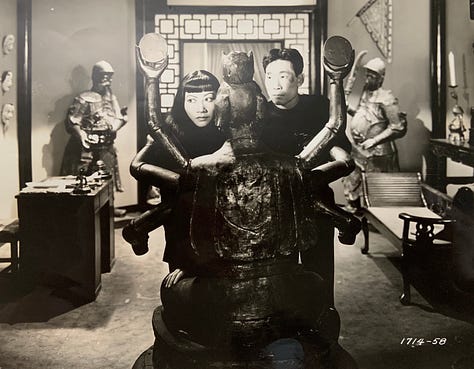
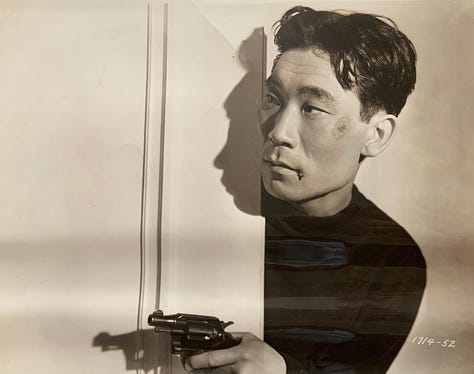
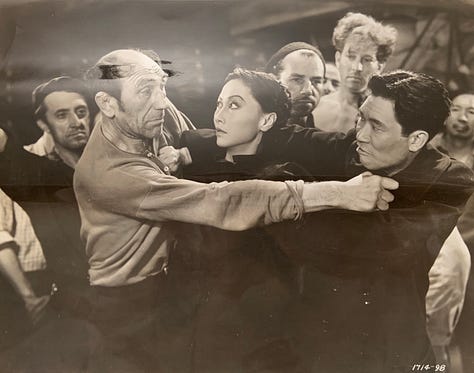
(Btw, the gossip columns tried to make hay out of their off-screen friendship and were constantly hinting that the two actors might be on the verge of eloping. As I write in my book, there was no truth to these rumors. AMW was busy carrying on an affair with a different man.)
In AMW’s time, Asian characters were routinely stereotyped in negative ways. Asian men were evil masterminds or emasculated, pidgin-speaking servants. Asian women were sexually available China dolls or cruel, dominating dragon ladies. All the more reason why Daughter of Shanghai was so revolutionary. Fast forward to 2023’s Beef and Asian American representation has accelerated past the stereotypes our community has traditionally had to overcome, to the point where Asian American media today is saturated with heartwarming tales of identity and family.
Beef has brought us full circle by telling a story about Asian Americans who are messy and imperfect and sometimes outright terrible people. As one critic put it, “Beef challenges the portrayal of Asian people as ‘good’ by presenting nuanced and deeply complicated characters who are honest, problematic, and angry.” Except that this time it’s on our terms with Korean American showrunner Lee Sung Jin calling the shots and a cast full of Asian American actors (not white actors in yellowface).
Arriving at a place where we can explore the full spectrum of Asian American experience—the good, the bad, and the ugly—is progress. As for Philip Ahn and Anna May Wong, their creative collaboration extended to one other nonstereotypical film, King of Chinatown, in 1939. AMW played a patriotic Chinese American surgeon modeled after real-life surgeon Dr. Margaret Chung and Philip acted as her steadfast fiancé whom she weds in the end.
Though these cinematic triumphs were short-lived, Philip Ahn still managed quite a prolific career as a character actor, appearing in more than 200 film and television programs from the 1930s to the 80s. Throughout his five decades in the business, he was alternately hyped as the “Oriental Clark Gable,” a “leering yellow monster” in the wartime roles he played vilifying the Japanese (which he relished as a way to karmically avenge his father’s death), and the wise monk guru Master Kan in the 1970s series Kung Fu (a nod to Dosan’s philosophical bent: “Snatch the pebble from my hand…”). What would Philip Ahn think about Beef if he were alive today? I’d like to think he would be pleasantly surprised that it’s merely a story about the (angry) guy next door, a role he’d probably be more than happy to take another crack at.

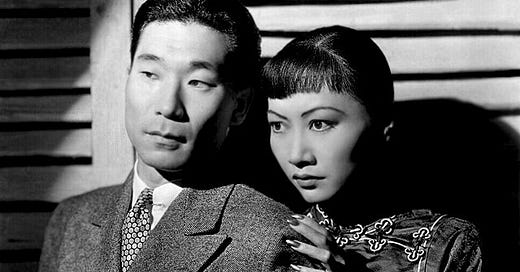




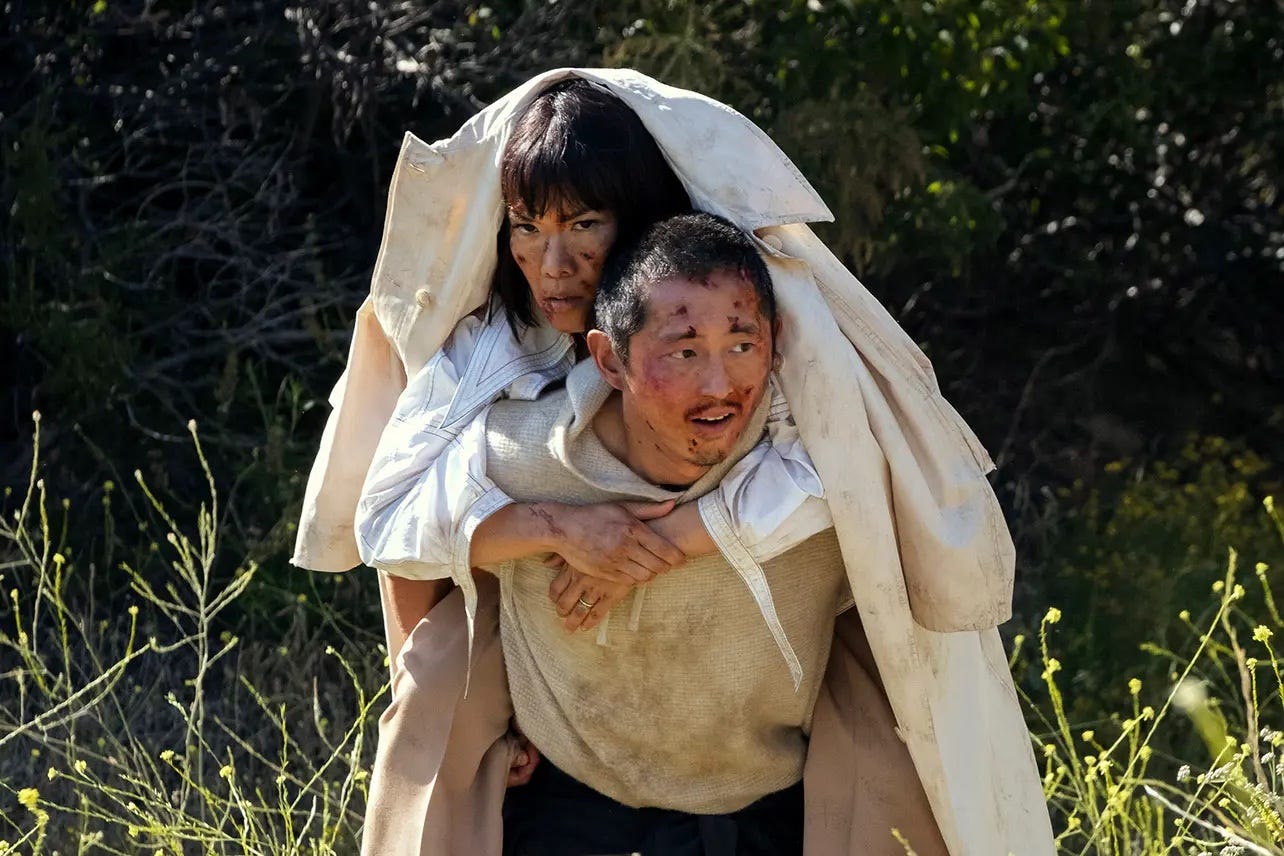




Loved reading this! "Finally, we can embrace the Asian American dirtbags, slackers, and scammers we’ve been waiting for" 😂 I've been SAYING. my own experience is knowing such characters exist in our own extended family (generations of poverty, survival, whaddya expect), which always made the model minority trope ironic.
I loved learning about this historical film - adding to my watchlist. The fact that the closing dialogue of this film takes place in Cantonese strikes me as seismic, even for today, and I suspect I will be equally misty eyed as the credits roll.
A fascinating history lesson, Katie. thank you. Daughter of Shanghai sounds like a must-watch. The on-set photography and publicity stills are already beckoning me into that world.
I am London based so unfortunately won't be able to make that screening but I'll find the film.
By the way, I wrote something about Beef a while back, considering the idea of rage and release. You might enjoy it. https://amarofpatel.substack.com/p/rage-ruin-rebirth